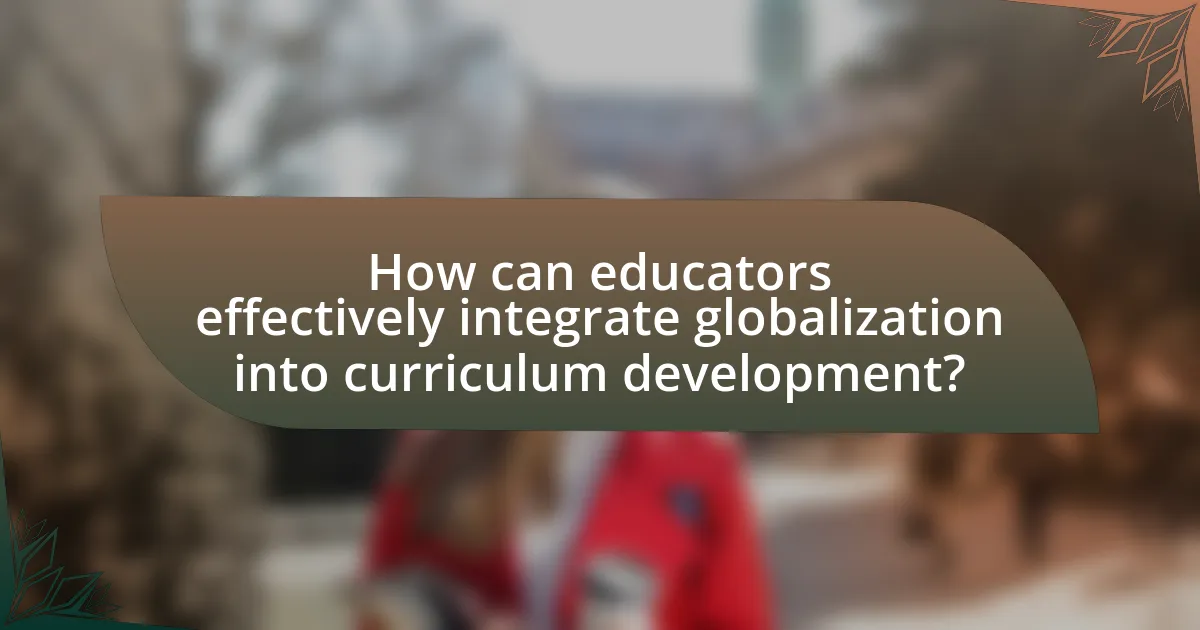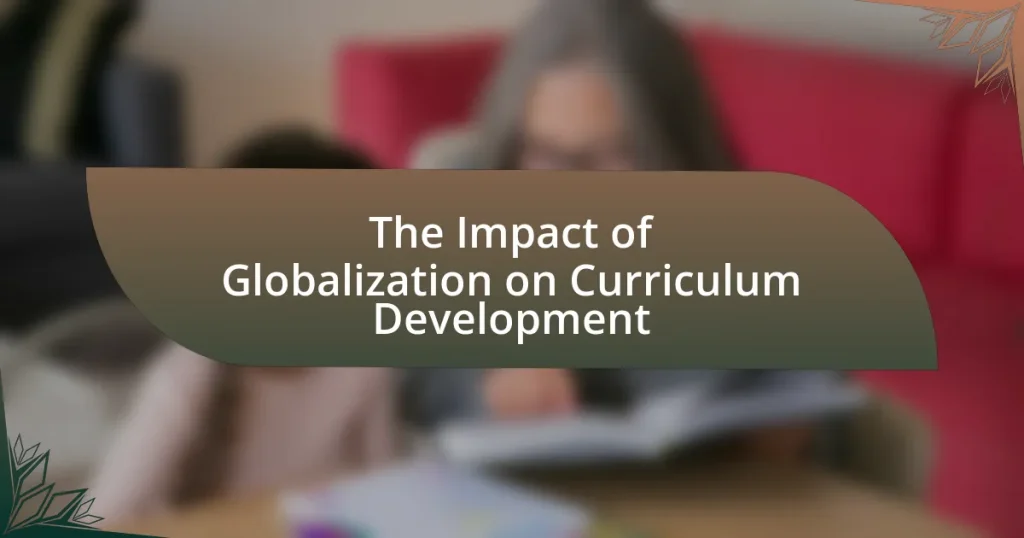The article examines the impact of globalization on curriculum development, highlighting how it promotes the integration of diverse cultural perspectives and global competencies within educational frameworks. It discusses the influence of international benchmarks, technological advancements, and cultural exchanges on educational systems, emphasizing the need for curricula that prepare students for a globalized workforce. Key factors affecting curriculum design include economic interdependence and the incorporation of global issues such as sustainability and social justice. The article also addresses challenges educators face in implementing globalized curricula and offers strategies for enhancing inclusivity and relevance in education.

What is the Impact of Globalization on Curriculum Development?
Globalization significantly influences curriculum development by promoting the integration of diverse cultural perspectives and global competencies into educational frameworks. This shift encourages educational institutions to adapt their curricula to prepare students for a globalized workforce, emphasizing skills such as critical thinking, collaboration, and cross-cultural communication. For instance, the incorporation of international standards and benchmarks, such as those from the International Baccalaureate, illustrates how globalization shapes educational content to meet global demands. Furthermore, research indicates that curricula increasingly reflect global issues, such as sustainability and social justice, aligning educational goals with worldwide challenges.
How does globalization influence educational systems worldwide?
Globalization influences educational systems worldwide by promoting the exchange of ideas, resources, and practices across borders, leading to more standardized curricula and increased access to diverse educational materials. This phenomenon is evident in the adoption of international benchmarks, such as the Programme for International Student Assessment (PISA), which encourages countries to align their educational standards with global expectations. Furthermore, globalization facilitates the integration of technology in education, enabling online learning platforms that provide access to quality education regardless of geographical location. As a result, educational systems are increasingly shaped by global trends, fostering a more interconnected and competitive learning environment.
What are the key factors of globalization affecting curriculum development?
The key factors of globalization affecting curriculum development include technological advancements, cultural exchange, economic interdependence, and international standards. Technological advancements enable access to diverse educational resources and facilitate online learning, which broadens the curriculum. Cultural exchange promotes the inclusion of global perspectives and multicultural content, enriching students’ understanding of the world. Economic interdependence necessitates skills that align with a global job market, prompting curriculum adjustments to meet these demands. Lastly, international standards, such as those set by organizations like UNESCO, influence curriculum frameworks to ensure competitiveness and relevance in a global context.
How do cultural exchanges shape curriculum content?
Cultural exchanges shape curriculum content by integrating diverse perspectives and practices into educational frameworks. These exchanges promote inclusivity and global awareness, allowing students to engage with different cultures, languages, and histories. For instance, programs like the Erasmus+ initiative in Europe facilitate student mobility and collaboration, leading to curricula that reflect a broader range of cultural contexts and knowledge systems. Research indicates that such integration enhances critical thinking and prepares students for a globalized workforce, as evidenced by studies showing improved intercultural competencies among participants in exchange programs.
What are the implications of globalization for curriculum standards?
Globalization significantly influences curriculum standards by promoting the integration of diverse cultural perspectives and knowledge systems. This integration leads to the development of curricula that are more inclusive and reflective of a globalized world, ensuring that students are equipped with skills necessary for international collaboration. For instance, the adoption of international benchmarks, such as the International Baccalaureate, illustrates how globalization encourages educational systems to align with global standards, enhancing the comparability of educational outcomes across countries. Furthermore, globalization drives the incorporation of technology and digital literacy into curricula, as educators recognize the need for students to navigate a digitally interconnected world.
How do international benchmarks affect local curriculum design?
International benchmarks significantly influence local curriculum design by providing standardized criteria that enhance educational quality and relevance. These benchmarks, such as those set by the OECD or UNESCO, guide local educators in aligning their curricula with global educational standards, ensuring that students acquire skills necessary for a competitive workforce. For instance, countries that adopt the OECD’s Programme for International Student Assessment (PISA) metrics often revise their curricula to emphasize critical thinking and problem-solving skills, reflecting the benchmarks’ focus on 21st-century competencies. This alignment not only improves educational outcomes but also facilitates international comparability, allowing local systems to assess their effectiveness against global peers.
What role do global competencies play in curriculum development?
Global competencies play a crucial role in curriculum development by ensuring that educational programs equip students with the skills necessary to thrive in a globalized world. These competencies include critical thinking, cross-cultural communication, and collaboration, which are essential for navigating diverse environments and addressing global challenges. Research by the Organisation for Economic Co-operation and Development (OECD) highlights that integrating global competencies into curricula enhances students’ ability to engage with international issues, fostering a more informed and adaptable workforce. This alignment with global competencies not only prepares students for future employment but also promotes social responsibility and cultural awareness, which are vital in an interconnected society.
Why is it important to adapt curricula in a globalized world?
Adapting curricula in a globalized world is crucial to ensure that education remains relevant and effective in preparing students for a diverse and interconnected society. Globalization has led to increased cultural exchange, technological advancements, and economic interdependence, necessitating educational frameworks that reflect these changes. For instance, the integration of global issues such as climate change, social justice, and digital literacy into curricula equips students with the skills needed to navigate and contribute positively to a complex world. Additionally, research indicates that curricula that embrace multicultural perspectives enhance critical thinking and foster inclusivity, which are essential competencies in a global workforce.
What challenges do educators face in implementing globalized curricula?
Educators face several challenges in implementing globalized curricula, including cultural relevance, resource availability, and training needs. Cultural relevance is crucial as curricula must reflect diverse perspectives and avoid ethnocentrism, which can alienate students. Resource availability poses a challenge since many schools lack access to updated materials and technology necessary for a globalized approach. Additionally, educators often require professional development to effectively teach globalized content, yet many institutions do not provide adequate training opportunities. These challenges hinder the successful integration of globalized curricula in educational settings.
How can curricula be made more relevant in a global context?
Curricula can be made more relevant in a global context by integrating global issues, diverse perspectives, and cross-cultural competencies into educational frameworks. This approach ensures that students are equipped with the knowledge and skills necessary to navigate an interconnected world. For instance, incorporating topics such as climate change, international relations, and cultural diversity fosters a broader understanding of global challenges. Research by the Organisation for Economic Co-operation and Development (OECD) highlights that education systems that emphasize global competencies prepare students for a more complex, globalized workforce. By aligning curricula with international standards and practices, educational institutions can enhance the relevance of their programs in a global context.

What are the effects of globalization on teaching methodologies?
Globalization significantly influences teaching methodologies by promoting diverse educational practices and integrating technology into the learning process. This integration allows educators to adopt a more collaborative and interactive approach, utilizing resources from various cultures and perspectives. For instance, the incorporation of digital tools facilitates access to global information and fosters cross-cultural communication among students. Research indicates that classrooms increasingly emphasize critical thinking and problem-solving skills, reflecting a shift from traditional rote learning to more dynamic, student-centered learning environments. This evolution in teaching methodologies is supported by studies such as the OECD’s “Teaching in a Digital Age,” which highlights the importance of adapting educational practices to meet the demands of a globalized world.
How do teaching practices evolve due to globalization?
Teaching practices evolve due to globalization by incorporating diverse cultural perspectives and pedagogical approaches. Globalization facilitates the exchange of educational resources, leading to the adoption of innovative teaching methods from various countries. For instance, the integration of technology in classrooms, influenced by global trends, enhances interactive learning experiences. Research indicates that countries adopting collaborative learning strategies, such as those seen in Finland, have improved student engagement and outcomes. Additionally, the emphasis on critical thinking and problem-solving skills in international curricula reflects a shift towards preparing students for a global workforce. This evolution is supported by studies showing that multicultural education fosters inclusivity and better prepares students for a diverse society.
What innovative teaching strategies emerge from global influences?
Innovative teaching strategies that emerge from global influences include collaborative learning, project-based learning, and the integration of technology in the classroom. Collaborative learning encourages students from diverse backgrounds to work together, fostering cross-cultural communication and teamwork skills. Project-based learning, which emphasizes real-world problem-solving, has been adopted globally to enhance critical thinking and creativity among students. The integration of technology, such as online learning platforms and digital resources, allows for personalized learning experiences and access to a wider range of information, reflecting global educational trends. These strategies are supported by research indicating that they improve student engagement and learning outcomes, as seen in studies conducted by the Organisation for Economic Co-operation and Development (OECD) and various educational institutions worldwide.
How does technology facilitate global learning experiences?
Technology facilitates global learning experiences by providing access to diverse educational resources and enabling real-time communication across geographical boundaries. Online platforms, such as MOOCs (Massive Open Online Courses), allow learners from different countries to engage with high-quality content and expert instructors, fostering a collaborative learning environment. For instance, Coursera and edX offer courses from top universities worldwide, making education more accessible. Additionally, tools like video conferencing and collaborative software enable students and educators to interact and share knowledge, breaking down cultural barriers and promoting a global perspective in learning. This interconnectedness enhances cultural exchange and prepares learners for a globalized workforce.
What are the benefits of incorporating global perspectives in teaching?
Incorporating global perspectives in teaching enhances students’ critical thinking and cultural awareness. This approach allows learners to understand diverse viewpoints, fostering empathy and collaboration in an increasingly interconnected world. Research indicates that students exposed to global perspectives perform better in problem-solving tasks and demonstrate improved communication skills. For instance, a study by the Asia Society found that students engaged in global learning are more likely to develop skills necessary for success in a global economy, such as adaptability and cross-cultural communication.
How does a globalized curriculum enhance student engagement?
A globalized curriculum enhances student engagement by incorporating diverse perspectives and real-world contexts that resonate with students’ experiences. This approach fosters a sense of relevance and connection to global issues, making learning more meaningful. Research indicates that students exposed to a globalized curriculum demonstrate higher motivation and participation rates, as they can relate their studies to current global challenges, such as climate change and social justice. For instance, a study by the Asia Society found that students engaged in globally-focused projects showed a 20% increase in classroom participation compared to those in traditional curricula. This evidence supports the notion that a globalized curriculum not only enriches educational content but also actively engages students in their learning process.
What skills do students gain from a globally-oriented education?
Students gain critical thinking, cultural awareness, and communication skills from a globally-oriented education. Critical thinking enables students to analyze and evaluate diverse perspectives, fostering problem-solving abilities in a global context. Cultural awareness helps students understand and appreciate different cultures, enhancing their ability to navigate multicultural environments. Communication skills, particularly in multiple languages, are developed through exposure to international curricula and collaborative projects, preparing students for global citizenship and workforce demands. These skills are essential in an increasingly interconnected world, as evidenced by studies showing that globally-oriented education enhances employability and adaptability in diverse job markets.
What challenges do educators encounter when adopting global teaching methods?
Educators encounter several challenges when adopting global teaching methods, including cultural differences, resource limitations, and varying educational standards. Cultural differences can lead to misunderstandings and misinterpretations of teaching materials, as educators may struggle to align global content with local contexts. Resource limitations, such as insufficient training and access to technology, hinder effective implementation of these methods. Additionally, varying educational standards across countries create inconsistencies in curriculum design and assessment, complicating the integration of global teaching practices. These challenges are supported by research indicating that successful global education requires careful consideration of local contexts and adequate support systems for educators.
How can teachers overcome resistance to change in curriculum practices?
Teachers can overcome resistance to change in curriculum practices by actively involving stakeholders in the decision-making process. Engaging teachers, parents, and students fosters a sense of ownership and reduces apprehension towards new methods. Research indicates that when educators participate in curriculum development, they are more likely to embrace changes, as seen in a study by Fullan (2007), which highlights the importance of collaboration in educational reform. Additionally, providing professional development opportunities equips teachers with the necessary skills and confidence to implement new practices effectively, further mitigating resistance.
What support systems are necessary for effective implementation?
Effective implementation requires robust support systems, including professional development, stakeholder engagement, and resource allocation. Professional development ensures educators are equipped with the necessary skills and knowledge to adapt to globalization’s demands, as evidenced by studies showing that ongoing training improves teaching effectiveness. Stakeholder engagement, involving collaboration among teachers, administrators, parents, and the community, fosters a shared vision and commitment to curriculum changes, which is critical for successful implementation. Additionally, adequate resource allocation, including funding for materials and technology, is essential; research indicates that schools with sufficient resources are more likely to successfully implement new curricula.

How can educators effectively integrate globalization into curriculum development?
Educators can effectively integrate globalization into curriculum development by incorporating diverse perspectives and global issues into learning objectives and content. This approach ensures that students understand the interconnectedness of cultures, economies, and environments. For instance, including case studies on international trade, climate change, and cultural exchange fosters critical thinking about global challenges. Research by the Organisation for Economic Co-operation and Development (OECD) highlights that curricula emphasizing global competencies prepare students for a competitive workforce in a globalized economy. By aligning educational practices with these principles, educators can create a more relevant and impactful learning experience.
What strategies can be employed for successful curriculum globalization?
Successful curriculum globalization can be achieved through the integration of diverse cultural perspectives, collaboration with international educational institutions, and the incorporation of global competencies into learning objectives. By including various cultural viewpoints, educators can create a more inclusive curriculum that reflects the globalized world. Collaborating with international institutions allows for the sharing of best practices and resources, enhancing the curriculum’s relevance and effectiveness. Furthermore, embedding global competencies—such as critical thinking, communication, and cross-cultural understanding—into the curriculum prepares students for a competitive global workforce. Research indicates that curricula incorporating these strategies lead to improved student engagement and better preparation for global citizenship.
How can collaboration with international partners enhance curriculum quality?
Collaboration with international partners enhances curriculum quality by integrating diverse perspectives and best practices from various educational systems. This collaboration allows institutions to adopt innovative teaching methods and curricular content that reflect global standards, thereby improving educational relevance and effectiveness. For instance, a study by the Organisation for Economic Co-operation and Development (OECD) highlights that countries that engage in international educational partnerships often see improvements in student performance and curriculum relevance, as they can benchmark against successful models from around the world.
What resources are available for educators to develop global curricula?
Educators can access various resources to develop global curricula, including online platforms, professional organizations, and educational frameworks. Online platforms such as UNESCO’s Global Education Monitoring Report provide comprehensive data and guidelines for integrating global perspectives into curricula. Professional organizations like the International Society for Technology in Education offer resources and best practices for incorporating technology in global education. Additionally, frameworks such as the United Nations Sustainable Development Goals serve as a guide for educators to align their curricula with global issues, ensuring relevance and engagement. These resources collectively support educators in creating curricula that reflect the interconnectedness of today’s world.
What best practices should educators follow when designing a global curriculum?
Educators should prioritize inclusivity, cultural relevance, and interdisciplinary approaches when designing a global curriculum. Inclusivity ensures that diverse perspectives are represented, allowing students to engage with multiple viewpoints and fostering a sense of belonging. Cultural relevance involves integrating local and global contexts, which enhances students’ understanding of their place in the world and promotes empathy. Interdisciplinary approaches encourage connections between subjects, reflecting the interconnected nature of global issues. Research indicates that curricula incorporating these elements lead to improved student engagement and critical thinking skills, as evidenced by studies showing that students exposed to diverse perspectives perform better in collaborative tasks and problem-solving scenarios.
How can educators ensure inclusivity in a globalized curriculum?
Educators can ensure inclusivity in a globalized curriculum by integrating diverse perspectives and materials that reflect the experiences of various cultures and communities. This approach involves selecting texts, resources, and case studies that represent a wide range of voices, particularly those that have been historically marginalized. Research indicates that inclusive curricula enhance student engagement and learning outcomes; for instance, a study by the American Educational Research Association found that students exposed to diverse content demonstrate improved critical thinking skills and cultural competence. By actively involving students in discussions about their own backgrounds and experiences, educators can create a more equitable learning environment that values all contributions.
What assessment methods are effective for evaluating global competencies?
Effective assessment methods for evaluating global competencies include performance-based assessments, portfolio assessments, and peer evaluations. Performance-based assessments require students to demonstrate their skills in real-world scenarios, which effectively measures their ability to apply knowledge in diverse contexts. Portfolio assessments allow students to compile and reflect on their work over time, showcasing their growth in global competencies. Peer evaluations foster collaboration and critical thinking, as students assess each other’s contributions and perspectives. Research indicates that these methods provide a comprehensive view of a student’s abilities, aligning with the demands of a globalized workforce.
What practical tips can educators use to navigate globalization in curriculum development?
Educators can navigate globalization in curriculum development by integrating diverse perspectives and global issues into their teaching materials. This approach fosters cultural awareness and prepares students for a globalized world. For instance, incorporating case studies from various countries can illustrate how local issues are interconnected with global trends, enhancing students’ critical thinking skills. Additionally, collaborating with international educators can provide insights into different educational practices and cultural contexts, enriching the curriculum. Research indicates that curricula that reflect global perspectives improve student engagement and understanding of complex global challenges, as highlighted in the study “Globalization and Education: The Quest for a New Paradigm” by Robert G. Bringle and Julie A. Hatcher.
